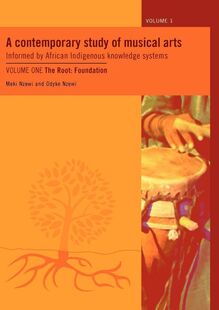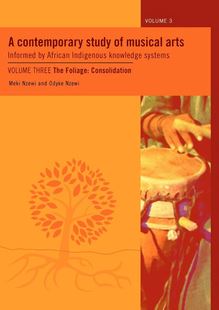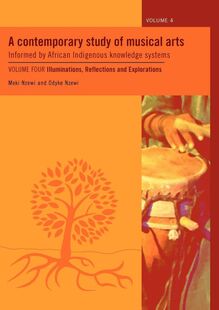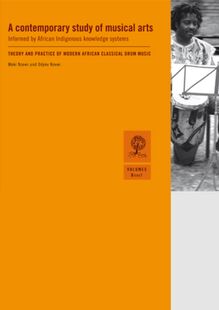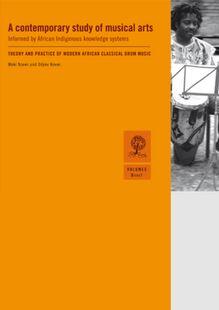Publié par
Date de parution
22 mars 2012
Nombre de lectures
5
Langue
English
Poids de l'ouvrage
2 Mo
Volume 2 – The Stem: Growth Modern literacy education in African music has hitherto focused more on observed context studies. The philosophical rooting and the psychological and therapeutic force that ground African indigenous musical arts have not been much discerned or integrated. Much needed in contemporary education, then, are integrative studies and literature materials that represent the intellectual base of the knowledge owners and creators, and which will ensure cognitive understanding of the indigenous musical arts systems of Africa.There is as yet no comprehensive, learner-centred book that fosters African indigenous knowledge perspectives and rationalisation about the musical arts. The concern over the years has been for the production of research-informed books for modern, systematic education in African musical arts that derive in essence from the original African intellectual perspectives about the sense and meaning of music – indigenous to contemporary.The five volumes of the musical arts study series derive from 36 years of research and analytical studies in African musical arts. The volumes address the pressing need for learning texts informed by the indigenous African musical arts systems that target tertiary education. The texts incorporate knowledge of conventional European classical music as they relate to the unique features of African musical arts thinking and theoretical content. The contemporary African musical arts specialist needs secure grounding in his/her own human-cultural knowledge authority in order to contribute with original intellectual integrity to African as well as global scholarship discourse and knowledge creation.
Voir
ACONTEMPORARYSTUDYOFMUSICALARTS INFORMEDBYAFRICANINDIGENOUSKNOWLEDGESYSTEMS
VOLUME2
THESTEM– GROWTH
Meki Nzewi
Ciimda series
A contemporary study of musical arts informed by African indigenous knowledge systems Volume 2
Author: Meki Nzewi Music typesetting & illustrations: Odyke Nzewi Reviewer and editor: Christopher Walton Copy editor: Hester Honey Proofreading: Chérie M. Vermaak Book design and typesetting: Janco Yspeert
ISBN 978-1-920051-63-1
© 2007 Centre for Indigenous Instrumental African Music and Dance (Ciimda) First edition, first impression All rights reserved
Production management: Compress www.compress.co.za
CONTENTS
I NTRODUCTION
MODULE 201:MUSICALSTRUCTUREANDFORMUNIT 1 –M:(USICAL TEXTURE PART RELATIONSHIP SIMULTANEOUS OCCURENCE AND UNIT 1 –/,) MOVEMENT OF PITCHES TONE LEVEL TIMBRES OF MUSIC NOTES IN TIME TOPIC 1 Towards harmonious sound in multipart music TOPIC 2 Polyphony – indigenous part organization TOPIC 3 Homophony TOPIC 4 Cadence/closure: indigenous and European classical UNIT 2 –FORM:DEVELOPMENTOFTHEMES,COMPOSITIONALANDPRESENTATIONALFORMS TOPIC 1 Development of themes and compositional forms in indigenous music TOPIC 2 Indigenous techniques for the development of a piece – performancecomposition and presentational form TOPIC 3 Nonmusical factors that shape presentation forms TOPIC 4 Standard compositional forms in European classical music
MODULE 202:FACTORSOFMUSICAPPRECIATIONUNIT 1 –CREATIVELISTENING TOPIC 1 The concept of the long triplet TOPIC 2 The interrhythm or twowiththree in part relationship UNIT 2 –A NALYTICAL PERCEPTION TOPIC 1 Reproduction and analysis of rhythm patterns TOPIC 2 Reproduction and analysis of melorhythmic statements TOPIC 3 Reproduction and analysis of melodies TOPIC 4 Hearing and identifying intervals UNIT 3 –TECHNICALREPRODUCTIONOFRECEIVEDSOUND TOPIC 1 Hearing, reproducing and writing rhythm patterns TOPIC 2 Hearing, reproducing and writing melorhythmic statements TOPIC 3 Hearing, reproducing and writing melodies TOPIC 4 Hearing, reproducing and writing intervals UNIT 4 –S ETTING TEXTS TO MELODY TOPIC 1 Composing melodies with texts in the local/own language
vii I
1
3 3 10 14 25 34 34
41 49 51
57 59 59 63 67 67 68 69 70 71 71 72 73 73 74 74
MODULE 203:MUSICINSTRUMENTSUNIT 1 –U SAGES OF MUSIC INSTRUMENTS TOPIC 1 Nonmusical usages of music instruments TOPIC 2 Musical usages of music instruments UNIT 2 –THESTRUCTUREOFANINDIGENOUSENSEMBLE TOPIC 1 Genres/types of ensemble TOPIC 2 Musical roles of music instruments in ensembles
75 77 77 80 83 83 84
MODULE 204:MUSICANDSOCIETY 89 UNIT 1 –MUSICALARTSINCOMMUNALLIFE 91 TOPIC 1 Musical arts as applied creativity and performance – the social category 91 TOPIC 2 Musical arts as applied creativity and performance – the political category 95 TOPIC 3 Musical arts as applied creativity and performance – the religious category 98 TOPIC 4 Musical arts as applied creativity and performance – the healing category 104 TOPIC 5 Musical arts as applied creativity and performance – the mass communication category 106 TOPIC 6 Musical arts evaluation and audience behaviour 109 UNIT 2 –NOTESONAPPRECIATINGAFRICANMUSICALARTS 112 TOPIC 1 Underlying African thoughts that guide rhythmic, harmonic, melodic and formal configurations 112 TOPIC 2 Understanding African musical arts through understanding the African philosophy of life 115
MODULE 205:RESEARCHPROJECTUNIT 1 –ANALYSISOFDATA,ANDWRITINGARESEARCHDOCUMENT TOPIC 1 Analysis of data TOPIC 2 Preparing a research treatise TOPIC 3 My personal ambition in studying music
MODULE 206:MUSICALARTSTHEATREUNIT 1 –R ’E CREATING CHILDREN S MUSIC IN DRAMA AND MOVEMENT TOPIC 1 Continued activities in promoting creativity UNIT 2 –CLASSTHEATREPROJECTS TOPIC 1 Class production project – dramatization in mime or danced drama TOPIC 2 Class production project – improvised sketches (solo/duet/trio/quartet) UNIT 3 –1C V LASS THEATRE PROJECTS FROM OLUME TOPIC 1 Organization of a theatre project the production team TOPIC 2 Class production project – dramatic improvisation TOPIC 3 Class production project – dramatization in mime or danced drama TOPIC 4 Class production project – improvised sketches (solo/duet/trio/quartet)
117 119 119 121 126
129 131 131 133 133 134 135 135 141 142 143
MODULE 207:SCHOOLSONGSTECHNIQUEUNIT 1 –G , UIDING ANALYTICAL CRITICAL AND AESTHETIC MUSICAL UNIT 1 –INTERPRETATION AND APPRECIATION TOPIC 1 Understanding a song text and its structure as an aid to interpretation TOPIC 2 The melodic structure of a song as an aid to creative arrangement, dramatization and/or dance TOPIC 3 Developing a critical vocabulary TOPIC 4 The plan of a creative singing period TOPIC 5 Teaching and learning aids for school song (with rural music teachers and learners in mind)
MODULE 208:PERFORMANCEUNIT 1 –STUDYOFSOLOANDACCOMPANIMENTINSTRUMENTS TOPIC 1 Approaches to education on performance TOPIC 2 Literacy approach to the study of indigenous music instruments TOPIC 3 Instruments of specialization
145
147 147
151 152 154
154
157 159 159 160 170
VOLUME 2
INTRODUCTION
The dry wood in a people’s environment cooks the food they need for nourishment. To understand others enriches one’s own. Igbo maxims
Need
Modern literacy education in African music has hitherto focused more on observed con-text studies. The philosophical rooting, the psychological and therapeutic force, and the humanning imperatives that ground African indigenous musical arts conceptualizations, theoretical-musicological content and contextual practices have not been much discerned or integrated. Much needed in contemporary education, then, are integrative studies and literature materials that represent the intellectual base of the knowledge owners andcreators, and which will ensure cognitive understanding of the indigenous musical arts systems of Africa. There is as yet no comprehensive, learner-centred book that fosters African indigenous knowledge perspectives and rationalization about the musical arts. The concern over the years has been for the production of research-informed books for modern, systematic education in African musical arts that derive in essence from the original African intellectual perspectives about the sense and meaning of music – indigenous to contemporary. Such books would enable discussion and research of the theoretical content, the philosophical and psychological foundations of creativity and practice, the nature and principles ofmusical arts theatre, and the historical process. The five volumes of the musical arts study series (the first three of which are progressive levels of study) address the pressing need for learning texts informed by the indigenous African musical arts systems that target tertiary education. The texts incorporate knowledge of conventional European classical music as they relate to the unique features of African musical arts thinking and theoretical content. The contemporary African musical arts spe-cialist needs secure grounding in her/his own human-cultural knowledge authority in order to contribute with original intellectual integrity to African as well as global scholarship discourse and knowledge creation. CIIMDA appreciates the collaboration of Professor Christopher Walton who reviewed and edited Volumes 1 and 2 of this series.
viii
ACONTEMPORARYSTUDYOFMUSICALARTS– VOLUME2
Background
The five volumes ofAcontemporary study of musical artsderive from 36 years of research and analytical studies in African musical arts – indigenous to contemporary. Sixteen years of practical research and advancement activities were undertaken in the Ama Dialog Foundation, Nigeria from 1983 to 1999. Subsequent research undertakings in southern Africa as a staff member of the Music Department, University of Pretoria, from 2000, with funding from both the National Research Foundation (NRF) of South Africa, and the Centre for Indigenous African Instrumental Music and Dance Practices (CIIMDA), funded by the Norwegian Foreign Office, have informed the series. The series further derive from my intensive creative and performance involvement in both indigenous and modern ensembles (modern African classical as well as popular), the teaching of African music, also thecreation (dialogue and composition) and production of musical arts theatre in tertiary institutions, as well as considerable practical education workshop activities (theory and practice of African drum ensemble music) in Africa and Europe.
A travelled mind gains more profound knowledge enrichment than a home-stuck mind, although a vague traveller (into other people’s knowledge systems) sheds sense of self. Igbo maxim
Research
Activities in some of the Modules in theA contemporary study of musical artsseries compel personal and group research as well as intellectual discourse. The essence of research is to stimulate self-mental illumination and intellectual growth, which will in turn contribute to knowledge advancement that will benefit the individual, others and humanity anywhere. Humanly research has always been the bedrock of African indigenous knowledge creations and advancements, and is essential for the construction and practice of the philosophy of humane living, globally, in contemporary times. The activities learning methodology em-phasized in these module series involves students in acquiring knowledge through personal research inquiry, participation and analysis of the known, that is the musical arts knowl-edge system within the students’ cultural imagination and realistic life experiences. The methodology adopted in the discussions, representations, interpretations and illustrations in the series has not been conceived to conform to the scholarly convention of literature survey and discourse as well as bibliographical shopping. This approach is for reasons of exigent redemptive cause direly needed in modern African scholarship environment. The concern is to focus without exogenous impositions and arguments on what is considered critical knowledge that expounds indigenous African intellectual authority, and which could help in forming original thinking among modern Africans in the contemporary scholarship emporium. The lecturers and the students are urged to conduct independent research for additional knowledge in the module themes, from field research as well as published and unpublished literature – books, manuscripts and documents available in accessible libraries
INTRODUCTION
and archives – needed to compare, dispute, substantiate, argue and expand the discussions in the book series. Hence we are concerned here with valid African indigenous epistemology rather than the discussion of published literature irrespective of perspicacity, substance or knowledge perspective.
We debase the moral foundation of our contemporary human systems when we de-value and de-virtue our indigenous musical arts systems.
Organization
The series is in five volumes designed for the study of the musical arts in the Music De-partments of colleges and universities in Africa in particular. The eight module titles for Volumes 1, 2 and 3 discuss the same knowledge concepts progressively as follows: Module 101/201/301 series – Music structure and form Module 102/202/302 series – Factors of music appreciation Module 103/203/303 series – Music instruments Module 104/204/304 series – Music and society Module 105/205/305 series – Research project Module 106/206/306 series – Musical arts theatre: The content is roughly the same for the three volumes on the rationale that productions in institu-tions of higher learning should involve all members of a De-partment of Music, working together as a production team, or in production teams, irrespective of year of study Module 107/207/307 series – School songs technique Module 108/208/308 series – Performance
Volume 3 has two additional modules: Module 309 – African musical arts and historical process Module 310 – History and literature of Western classical music
A module is sub-coded into unit themes developed as lecture topics that are broken down into steps of study. Volume 4 of the series is a collection of essays in indigenous music, dance and drama that could enrich perception on issues in musical arts scholarship for students and research-ers engaged in disciplinary specialization. It includes specialist discussions on dance and authentic African drama. Volume 5 is on modern African classical drumming as an instrument of specialization for contemporary concert performances. It contains repertory for solo drumming, drum and voice/saxophone/trumpet duos, and inter-cultural drum ensemble works. Some specific knowledge items recur across the volumes and modules to furnish addi-tional perspectives or explicatory insights. Volume 1 further takes into account the fact that education in the musical arts incontemporary Africa has been hitherto modelled on the mental and material resources of
ix
x
ACONTEMPORARYSTUDYOFMUSICALARTS– VOLUME2
European classical music. Most music students in Africa who are admitted to study music in tertiary institutions may be deficient in the borrowed theory and practice of Western music on which curricula are based, and may have no theoretical knowledge or practical experience at all of African indigenous music knowledge systems. Even for learners with an adequate background of European classical music education and practice, there is little awareness about the fact that strong theoretical formulae and philosophical issues inform creativity and performance in the African indigenous musical arts system.
A teacher who does not learn from interaction with learners is not an educator; A parent who does not learn from children at play is not an adult mind; Every person is born with the pristine genetic intelligence of a culture; the nature of upbringing nurtures or maims inborn knowledge.
MODULE12021 MUSICAL STRUCTURE ANDFORM
UNIT 1 – MUSICAL TEXTURE: PART RELATIONSHIP (SIMULTANEOUS OCCURRENCE AND MOVEMENT OF PITCHES/TONE LEVEL, TIMBRES OF MUSIC NOTES IN TIME) TOPIC 1 Towards harmonious sound in multipart music TOPIC 2 Polyphony – indigenous part organization TOPIC 3 Homophony TOPIC 4 Cadence/closure: indigenous and European classical
UNIT 2 – FORM: DEVELOPMENT OF THEMES, COMPOSITIONAL AND PRESENTATIONAL FORMS TOPIC 1 Development of themes and compositional forms in indigenous music TOPIC 2 Indigenous techniques for the development of a piece – performancecomposition and presentational form TOPIC 3 Nonmusical factors that shape presentation forms TOPIC 4 Standard compositional forms in European classical music
3 3 10 14 25
34 34
41 49 51
